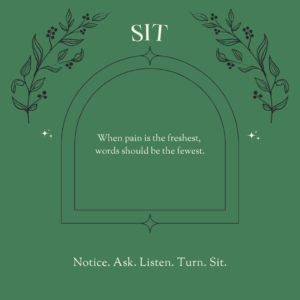When pain is the freshest, words should be the fewest.
I forget where I first heard that and who to credit, but when it comes to walking with suffering people, I’d say it’s a pretty good rule of thumb. We’ve taken a few weeks to open a discussion on that topic — how can we as a church relate graciously and tenderly to people in their sorrow. To this point, we have considered four practices. On week one, we asked you to be alert to those in your circle who may be in hardship. The next week, we urged you to be praying that God would make you genuinely loving toward those who suffer. After that, we emphasized the rare-yet-simple practice of quiet, focused attention. And last week, we suggested turning together (both the friend and the sufferer) to Jesus for help. This is built on the certainty that Christ is our principle need — both in ease and in hardship. I gave you four simple verbs that correspond to each practice: notice, ask, listen and turn.
Today, I’ll give the fifth and final suggestion and corresponding verb. Today, I’m urging you to prioritize the ministry of presence — simply endeavoring to be a steady, faithful, compassionate friend to those in sorrow. We’ll use the verb “sit”. Obviously, this doesn’t mean that this ministry can only be accomplished in a seated position (though I tend to think that this is probably best). I’m drawing it from Job 2 when Eliphaz, Bildad, and Zophar heard about the sorrow their friend had endured, left their homes, found Job, wept, then sat on the ground with him for a solid week — seven days and seven nights. And according to Job 2:13, “no one said a word”.
Who knows why, but hardship is almost always compounded when it’s experienced in isolation. We simply were not meant to walk out our seasons of deep grief alone. Incidentally, we’ll see this emphasized in the familiar middle verses of Sunday’s text.
Two are better than one
because they have a good reward for their toil.
For if they fall, one will lift up his fellow.
But woe to him who is alone when he falls and has not another to lift him up!
Again, if two lie together, they keep warm, but how can one keep warm alone?
And though a man might prevail against one who is alone,
two will withstand him
and a threefold cord is not quickly broken.
I have a friend named John who lives in Nebraska. Over the years that I’ve known him, I have watched him move tenderly and intentionally toward people in difficulty. It’s largely unseen. He just has a compassionate heart. He notices when people are hurting. And he’s willing to boldly move toward them in their pain. For the life of me, I can’t recall a single word of counsel that I have heard him offer. I’m sure he’s given helpful advice to people in sorrow; I just can’t recall it. What I have observed (and what has impacted me most significantly) is watching him practice the ministry of presence. He just knows when to show up. And remarkably, God has used it. And he is beloved among the people in his community, I suspect for that very reason. I want to be like John. I want us all to be like John.
So that should get us started. Notice those in sorrow. Ask God to deepen in you a love for those who suffer. Humbly listen. Turn with them to our merciful Lord Jesus. And, if necessary, set down your bag, pull up a chair, and sit for a while.

